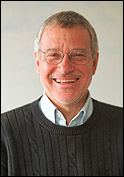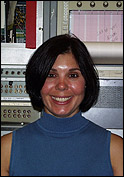At issue
If you could change one thing about the way the media portrays science, what would it be?
 PHOTOS: Owen Egan
PHOTOS: Owen Egan
| |
Dr Margaret Becklake
Department of Epidemiology and Biostatistics
The media form an essential link between science and popular understanding. I would like to see them stop representing the biological sciences as a series of catchy sound bites and make a serious effort to help the public understand the process of hypothesis formulation, testing, rejection and reformulation which characterizes scientific research. The results of one study will always require confirmation or rejection through further research. In a democracy, the general public must understand what science is about. They cannot unless the media accept this challenge.

| |
Professor Peter Caines
Department of Electrical and Computer Engineering
The most striking aspect of newspaper science journalism is how little there is of it. The book publishing industry generates an enormous number of volumes each year popularizing science, technology and mathematics, while radio carries highlights such as CBC's "Quirks and Quarks." Science on TV is weak, but the Internet gives access to a vast range of material. In the information age, newspaper scientific journalism doesn't measure up very well. The notable exception is The New York Times, selections of whose articles the rest of the press often just reprints. In comparison to the other media, it seems to me that the press underestimates popular interest in science.

| |
Dr Rejeanne Gougeon
Nutrition and Food Science Centre, Royal Victoria Hospital
I would reduce the sensationalism that often accompanies reports on scientific issues. Too often the media, either on its own or through the manipulation of particular interest groups, writes about science in a way that raises false expectations or wild and unjustified fears. Science is turned into drama where there must be a hero and a villain. Of course, there have been dramatic discoveries in science, but behind each one lies painstaking testing, intense technical debate and much caution before any consensus is reached. Too often, those who know how to dramatize, but haven't seen the inside of a lab for years, get equal weight in reports as those who understand first-hand the complexities and uncertainties with which they deal on a daily basis.

| |
Angelina Guzzo
Medical student currently doing an aerospace medicine clerkship at the Kennedy Space Center in Florida through the Canadian Space Agency
Science is part of daily living. Science allows you to wake up in the morning to a fresh cup of coffee and a warm shower. Yet the media portrays science as untouchable. With such views, society pays a price. Just as the words "medical breakthrough" and "new discovery" invoke promises of better health and knowledge, the words "genetic selection" and "cloning" conjure up images of unethical practices. If people believe that science is accessible then everyone would want to be involved in important issues such as setting ethical standards and national budgets for scientific research as well as the quality of science taught to their own children.

